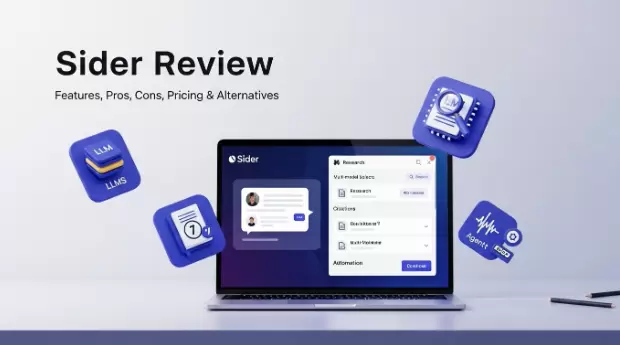For innovative businesses who trying to reach a worldwide audience, Product Hunt is an important platform to capture a global audience. But depending just on Product Hunt could make it challenging for your company to grow outside its existing market if the digital terrain changes in 2025.
Diverse your launch plan regardless of your startup—pre-launch validation, B2B SaaS company targeting decision-makers, or developer tool searching for a niche audience.
From beta testing to post-launch reviews, the platforms below provide specific capabilities such audience analytics, competitive analysis, global multilingual support, and fit across numerous stages of the product development cycle.
With these options, businesses are able to tap into highly niche communities, collect meaningful feedback and refine their approach to increase conversions.
1. G2
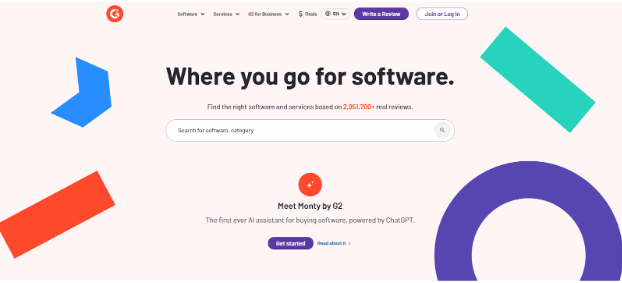
G2 is now regarded as one of the most trusted software review and comparison platforms. Founded in 2012 and headquartered in Chicago, G2 has grown to be among the most trusted resources for software reviews.
With over 60,000 softwares listed and over 1 million verified user ratings, G2 is a go-to tool for companies negotiating the vast SaaS ecosystem.
Unlike Product Hunt, which focuses on product launches, G2 promotes long-term customer satisfaction and real-world performance, making it a trusted platform.
The platform’s Grid Reports are particularly popular, offering visual comparisons of top contenders in each niche. For startups, G2 also provides a launchpad to gain visibility through authentic reviews, while enterprises leverage its data to optimize tech stacks.
Key Features :
- Verified Reviews: Over 1 million reviews across 1,500+ categories, with moderation to prevent fake submissions.
- Comparison Tools: Side-by-side feature comparisons, pricing insights, and user satisfaction scores.
- Free & Paid Tiers: Access basic data for free or unlock advanced analytics with a subscription.
Why Use It?
Perfect for enterprises prioritizing data-driven decisions overhype. G2’s emphasis on verified reviews ensures you’re investing in tools that deliver measurable ROI.
2. BetaList
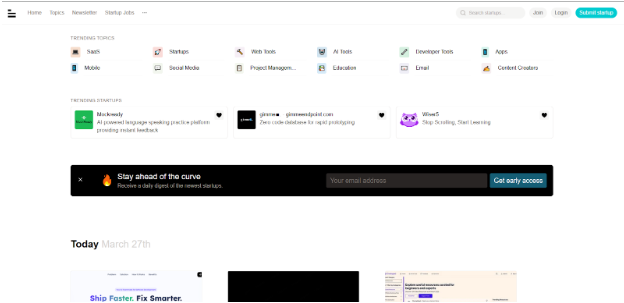
Launched in 2013, it has become the foundation for business owners. With a community of over 500,000 tech enthusiasts, BetaList operates on a simple premise: crowdsource certification for pre-launch items.
BetaList’s daily newsletter amplifies visibility, delivering top submissions to a massive audience. Unlike Product Hunt’s broader focus, BetaList caters specifically to MVP-stage startups, offering a space to refine ideas before scaling.
Key Features :
- Upvote-Driven Visibility: Products gain traction through community votes, with top picks featured in newsletters.
- Weekly Newsletter: Highlights top launches to 500,000+ subscribers.
- Founder-Friendly: No fees for submitting or promoting your product.
Why Use It?
Ideal for pre-launch startups seeking rapid user testing and buzz. BetaList’s tight-knit community ensures honest feedback and early adopter engagement.
3. Microlaunch
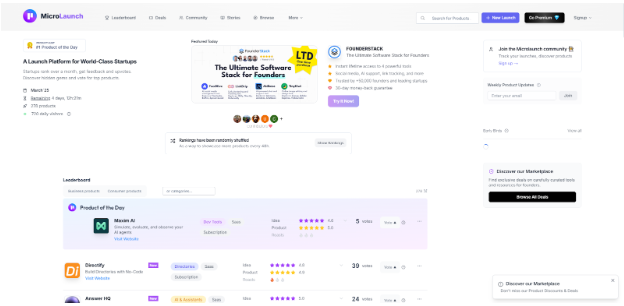
Microlaunch is an all-in-one platform that allows you to launch your new goods, get valuable feedback, and attract your first customers in a month. It’s a rising star in the indie hacking community.
Founded in 2022, the platform emphasizes simplicity and quickness, allowing artists to share their tools with a group that values practicality above polish. Microlaunch offers manufacturers and startups a special place for distribution.
Key Features :
- MVP-Focused: Showcase early-stage tools to a community of 10,000+ indie hackers.
- Weekly Competitions: Win cash prizes and recognition for top submissions.
- No Upfront Costs: Free to submit and promote your project.
Why Use It?
Perfect for indie developers testing niche ideas. Microlaunch’s community thrives on experimentation, making it a low-risk environment for unproven concepts.
4. Capterra
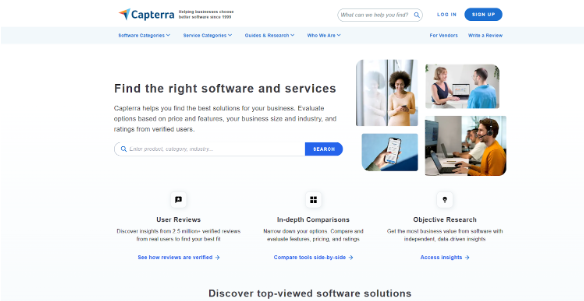
Owned by Gartner, Capterra is a powerhouse in the B2B software industry, connecting businesses with over 500,000 items across 700+ categories.
Since its foundation in 1999, Capterra has evolved into a one-stop shop for business software solutions, including exact filters for business, price, and deployment method.
With 100,000+ software vendor listings, Capterra has SaaS companies of all sizes. However, it’s most popular with mid-market and smaller business suppliers, which make up over 75% of its base.
Key Features :
- Vast Catalog: 500,000+ software products with user reviews and ratings.
- Advanced Filters: Narrow searches by price, features, or industry.
- Free Tools: Access buyer’s guides, white papers, and ROI calculators.
Why Use It?
Ideal for B2B vendors targeting decision-makers. Capterra’s high-intent traffic translates to qualified leads and faster sales cycles.
5. StartupStash
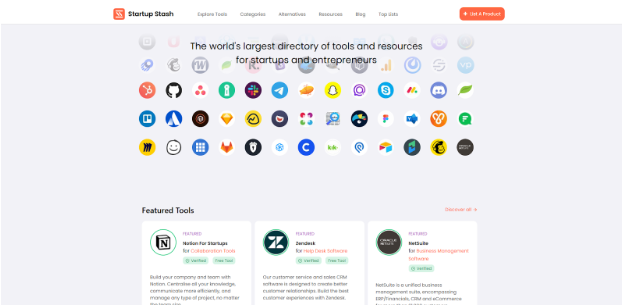
StartupStash is a trove of resources for founders, providing a curated catalog of 10,000+ tools in over 200+ categories. From design assets to growth hacking tools, the platform is designed to help entrepreneurs save time and money by finding validated solutions.
Each tool is marked with use cases (e.g., “user onboarding” or “SEO optimization”), making it easy to identify specialist items. StartupStash also provides a blog with concrete advice on scaling, fundraising, and product growth, creating a complete ecosystem for entrepreneurs.
Key Features :
- Curated Directory: 10,000+ tools handpicked for quality and relevance.
- Category Filters: Browse by stage (pre-launch, growth) or function (marketing, dev).
- Educational Blog: Free guides on startup best practices.
Why Use It?
A time-saver for founders overwhelmed by the sheer volume of SaaS tools. StartupStash’s curation ensures you only explore proven solutions.
6. DevHunt
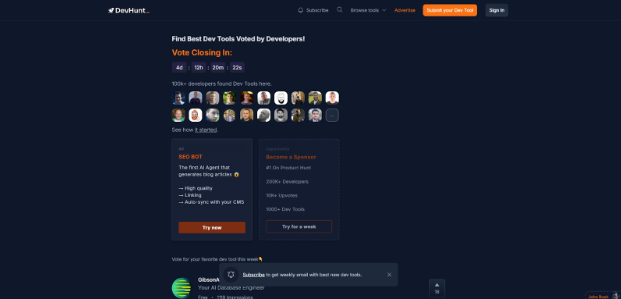
DevHunt is a specialized service designed for developers and technical founders. It was set up in 2023 and specializes in features that automate coding and proprietary deployment and foster collaboration.
APIs, dev tools, infrastructure solutions - everything is provided by a single vetted community of 50,000+ engineers.
DevHunt has an active ‘Hunt’ culture that allows users to submit the tools they have developed or discovered. The platform also contains highlights of open source, which fosters collaborative innovation.
Key Features :
- Developer-Centric: Tools for coding, APIs, DevOps, and open-source projects.
- Community-Driven: Submissions are upvoted by developers, ensuring quality.
- Free to Use: No cost for submitting or discovering tools.
Why Use It?
Perfect for technical teams seeking tools that solve specific coding challenges. DevHunt’s focus on functionality over marketing makes it a trusted resource.
7. Alternative.me
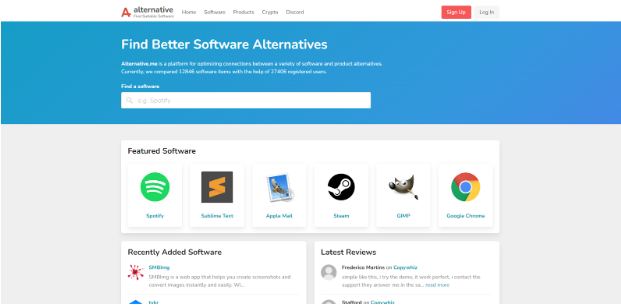
Alternative.me is a comparison focused, software centered platform that outlines alternatives to the most popular software. The website helps you find a suitable CRM or a less-known privacy-based analytic tool by gathering reviews and associated features.
The platform’s “Alternatives Engine” analyzes your needs (e.g., budget, team size) to recommend tailored options. With over 10,000 products listed, Alternative.me is a go-to for users disillusioned with mainstream tools.
Key Features :
- Alternatives Engine: Get personalized recommendations based on your criteria.
- User Reviews: Honest feedback on pricing, ease of use, and support.
- Privacy Filters: Find GDPR-compliant or open-source alternatives.
Why Use It?
Ideal for cost-conscious teams or privacy advocates. Alternative.me cuts through marketing noise to highlight practical options.
8. Slant
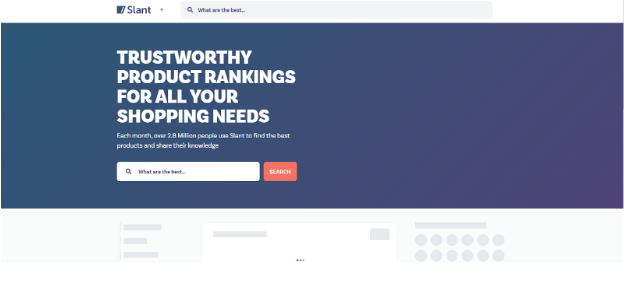
Slant leverages crowdsourcing to help users discover tech tools and gadgets across 500+ categories. The platform’s voting system surfaces top picks for everything from coding boot camps to VR headsets.
Each product page includes pros, cons, and user-generated guides, offering a balanced view. Slant’s community of 100,000+ tech enthusiasts ensures recommendations stay up-to- date with trends.
Key Features :
- Voting System: Products rise in rankings based on community votes.
- In-Depth Guides: Step-by-step tutorials for using tools effectively.
- Free Access: No paywalls or hidden costs.
Why Use It?
Great for tech hobbyists and professionals looking for unbiased recommendations. Slant’s guides add practical value beyond basic reviews.
9. Softpedia
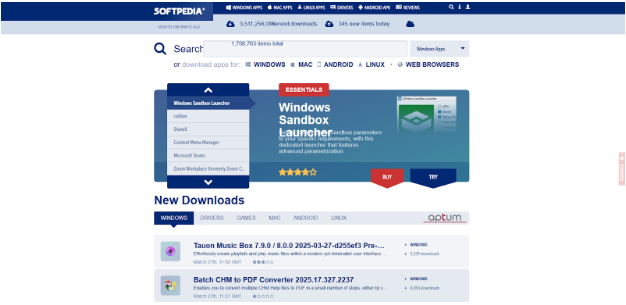
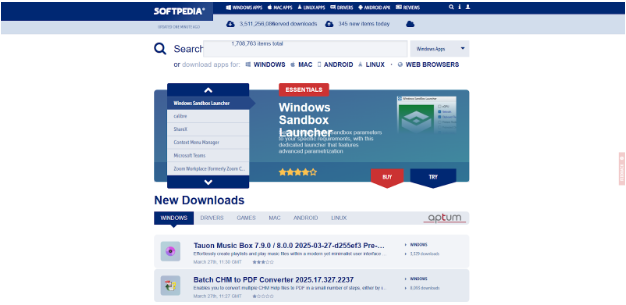
Founded in 2001, Softpedia is a veteran platform offering downloads and reviews for desktop software, from productivity tools to games. With over 1.5 million downloads served, it’s a relic in an era dominated by SaaS.
Softpedia’s rigorous malware checks make it a safer option for downloading legacy software. The site also features news and tutorials, catering to users who prefer offline tools.
Key Features :
- Vast Archive: 1.5 million+ software downloads.
- Malware Checks: Ensures downloads are safe and virus-free.
- Niche Categories: Find retro tools or specialized desktop apps.
Why Use It?
Perfect for users who rely on desktop software or need legacy tools unsupported by modern SaaS platforms.
10. GetApp
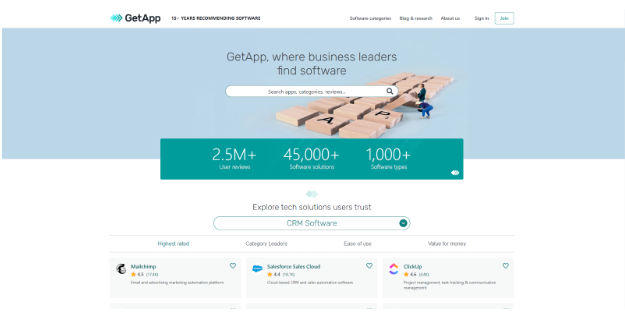
GetApp is one of Gartner’s subsidiaries that makes software discovery easier. The platform has over 10,000 business tools and specializes in their usability and integration features.
GetApp’s “App Score” rewards tools based on user reviews, features, security, and many more, all helping companies evade reckless spending. Take the hurdle of new software head- on without the fear of buying a new tool, as the platform offers free trials and demos.
Key Features :
- App Score: Objective ratings based on reviews and security.
- Free Trials: Test tools before committing.
- Integration Filters: Find software compatible with your existing stack.
Why Use It?
Ideal for SMBs seeking user-friendly tools with proven track records. GetApp’s App Score minimizes the risk of bad purchases.
11. AlternativeTo
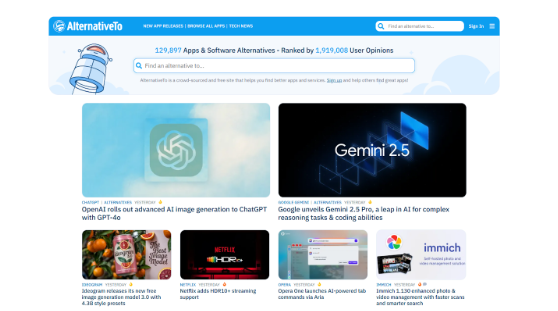
AlternativeTo is a crowdsourced directory of software alternatives, with over 300,000 user-generated recommendations. The platform’s tagline—“Crowdsource your software choices”—captures its ambition to democratize decision-making.
Users might look for alternatives by platform (Windows, macOS), license type (open-source), or category. The community-driven approach ensures fresh, unbiased suggestions.
Key Features :
- 300K+ Alternatives: User-submitted swaps for nearly every software category.
- License Filters: Find open-source or freemium tools.
- Platform-Specific Searches: Narrow results by OS or device.
Why Use It?
Perfect for users tired of mainstream tools or seeking open-source alternatives. AlternativeTo’s community keeps recommendations current.
Conclusion :
In 2025, relying solely on Product Hunt for product launches poses risks in an evolving digital landscape. The platforms highlighted here offer tailored solutions to diversify your strategy.
Each platform brings unique strengths that address specific pain points. By accepting these alternatives, companies can future-proof their launch strategy, tap into active communities, and turn feedback into meaningful growth—without over-relying on a single platform. By connecting into these platforms, companies can secure their strategy and survive in an ever- changing ecosystem.


 Table of Content
Table of Content




